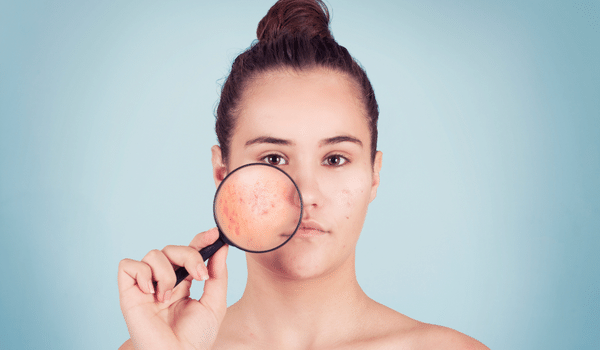While we’ve all heard different tips on how to get clearer skin; you might also be asking, what is considered moderate acne? If you’re unsure of the severity of your acne, don’t miss our article on mild vs. moderate acne to understand the differences between the two. Understanding the type of acne you are experiencing will help you and your dermatologist choose the best treatment plan to obtain clearer skin.
There are four types of acne: comedones, papules and pustules, nodules, and cystic acne. Papules and pustules are considered moderate acne.
What is considered moderate acne?
Moderate acne is when mild acne, comedones, becomes inflamed. When a comedo ruptures, the bacteria inside of it is released into the skin, causing an infection that turns this spot into a papule or pustule. A papule is formed when the bacteria from the comedo is triggered by other bacteria and excess oil production. Stress and diets that include a high intake of sugar can trigger papules. A papule is not filled with pus, but often becomes a pustule.
Pustules, which you may know more commonly as a whitehead, are often caused by hair follicles becoming plugged with excess oil and dead skin cells. They most commonly occur on the face, back, and chest, but can occur all over your body. Pustules can also be caused by an allergic reaction or hormones.
How can you tell if you have moderate acne?
Acne is irritating, so it’s easy to label your acne worse than it really is. You may have moderate acne if at least three of the following statements describe your skin:
- Over-the-counter treatments don’t help
- You have a lot of noticeable bumps – both closed bumps and blackheads
- Your breakouts are often red and inflamed (i.e., whiteheads)
- Some of your acne is painful and feel as if they start deep within your skin
- Your acne has periods where it suddenly becomes worse
- You notice dark spots or scarring where acne occurred
If you don’t quite say yes to three of these statements, you may have mild acne. Mild acne can easily form into moderate acne, so talking to your dermatologist now can help prevent your acne from becoming worse.
Why see a dermatologist for moderate acne?
Moderate acne, especially when it occurs for a long time, can be difficult to manage without the help of a dermatologist. Because moderate acne is often inflamed, it can easily lead to scarring. Plus, it’s easy to want to pick at our faces when acne is constantly present. Prescribed moderate acne treatment can help prevent additional acne from occurring, while also treating your current acne. Minimizing your breakouts will hopefully alleviate habits like skin-picking and help you avoid scarring.
Preventing acne
While prescribed acne treatment will be part of your skin care regimen, there are other things that you can do to prevent acne that your dermatologist will discuss as well. Keeping your skin clean and moisturized is an important step to preventing acne. You might think that if your skin is oily, you don’t need to moisturize. Instead of skipping your moisturizer, use oil-free moisturizers or moisturizers made for acne-prone skin.
Part of keeping your skin clean also means keeping your hands away from your face. This is easier said than done. Also be mindful of the products you’re using in your hair. Many products can be irritating to your skin, causing breakouts.
Moderate acne treatment
To determine your moderate acne treatment regimen, your dermatologist will work with you to create a plan that works with your lifestyle and acne type.
Moderate acne is often treated with prescription acne medication. Your dermatologist may prescribe topical retinoid or antibiotic medications, but most effective moderate acne treatment plans use a combination of the two. Topical retinoid and antibiotics medications for this type of acne can include azelaic acid, Differin, Retin-A, and clindamycin.
A common topical acne medication prescribed by dermatologists at Vujevich Dermatology is Tretinoin Cream. Tretinoin Cream not only reduces clogged pores and normalizes oil production, it also prevents new acne forming and improves shallow scars. The niacinamide in Tretinoin Cream is an anti-inflammatory product that also minimizes oil production. When starting new products, allow products at least six weeks before expecting results.
Whether you are preventing or treating moderate acne, a dermatologist can help you create a consistent skin care regimen. Vujevich Dermatology Associates offers medical, surgical, and cosmetic dermatology from some of the most highly trained physicians and clinicians in the greater Pittsburgh area. You can reach our team at 412-429-2570 or visit our contact page to see all of our locations. You can also follow us on Facebook to see what’s new in the world of dermatology.

